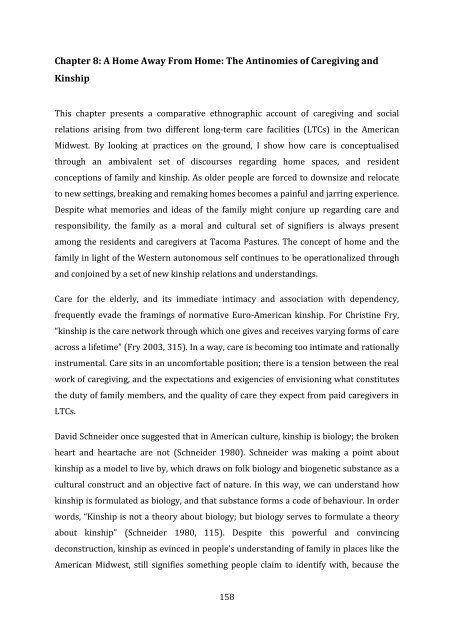Philip Y. Kao PhD thesis - Research@StAndrews:FullText
Philip Y. Kao PhD thesis - Research@StAndrews:FullText
Philip Y. Kao PhD thesis - Research@StAndrews:FullText
Create successful ePaper yourself
Turn your PDF publications into a flip-book with our unique Google optimized e-Paper software.
Chapter 8: A Home Away From Home: The Antinomies of Caregiving and<br />
Kinship<br />
This chapter presents a comparative ethnographic account of caregiving and social<br />
relations arising from two different long-term care facilities (LTCs) in the American<br />
Midwest. By looking at practices on the ground, I show how care is conceptualised<br />
through an ambivalent set of discourses regarding home spaces, and resident<br />
conceptions of family and kinship. As older people are forced to downsize and relocate<br />
to new settings, breaking and remaking homes becomes a painful and jarring experience.<br />
Despite what memories and ideas of the family might conjure up regarding care and<br />
responsibility, the family as a moral and cultural set of signifiers is always present<br />
among the residents and caregivers at Tacoma Pastures. The concept of home and the<br />
family in light of the Western autonomous self continues to be operationalized through<br />
and conjoined by a set of new kinship relations and understandings.<br />
Care for the elderly, and its immediate intimacy and association with dependency,<br />
frequently evade the framings of normative Euro-American kinship. For Christine Fry,<br />
“kinship is the care network through which one gives and receives varying forms of care<br />
across a lifetime” (Fry 2003, 315). In a way, care is becoming too intimate and rationally<br />
instrumental. Care sits in an uncomfortable position; there is a tension between the real<br />
work of caregiving, and the expectations and exigencies of envisioning what constitutes<br />
the duty of family members, and the quality of care they expect from paid caregivers in<br />
LTCs.<br />
David Schneider once suggested that in American culture, kinship is biology; the broken<br />
heart and heartache are not (Schneider 1980). Schneider was making a point about<br />
kinship as a model to live by, which draws on folk biology and biogenetic substance as a<br />
cultural construct and an objective fact of nature. In this way, we can understand how<br />
kinship is formulated as biology, and that substance forms a code of behaviour. In order<br />
words, “Kinship is not a theory about biology; but biology serves to formulate a theory<br />
about kinship” (Schneider 1980, 115). Despite this powerful and convincing<br />
deconstruction, kinship as evinced in people’s understanding of family in places like the<br />
American Midwest, still signifies something people claim to identify with, because the<br />
158
















